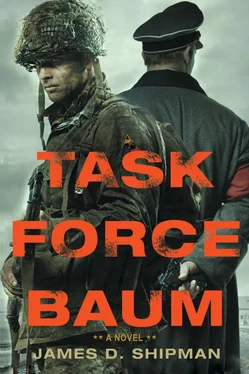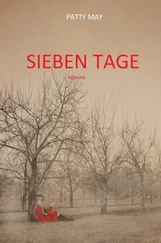He took a couple of feeble steps toward the wire. His legs shook, and he shivered in the cold. He glanced down at his skeletal frame. How much weight had he lost in the past few months? Thirty pounds? Maybe more. He couldn’t weigh more than 150 now. There was never enough food. Even with the occasional Red Cross package, they were all starving. In the last month, the Germans had cut their meager rations in half. Rumor had it the guards were getting less food too. Further proof, if any was needed, that the war would soon be over.
He turned and headed away from the fences, nodding here and there to other forlorn scarecrows standing silent vigil in the camp. As he stumbled on, a figure caught his attention, approaching with an arm waving to attract his attention. Curtis looked over. It was Goode’s aide.
“What is it?” the captain asked, wiping a hand through his greasy brown hair.
“The boss wants you.”
“Do you know why?”
“Search me,” said the messenger, his broomstick of an arm almost folding over itself as he pulled it down.
Curtis breathed in deeply. He didn’t feel like going just now. It meant a long walk, and he was already exhausted. Why had he volunteered in the first place? Well, at least it was something to do. He nodded by way of acknowledgment, and the man shuffled off to pass the message to others.
Curtis turned and headed toward the POW headquarters, his breath coming in rapid spurts from the effort as he passed row after row of Allied barracks looming over him to his right. The buildings were rectangular and brick. The sturdy structures had served as a German training camp before the war. After a few minutes, he entered the headquarters building, a larger structure set off by a courtyard from the rest of the housing. The front of the building consisted of a forty-by-forty room with a couple of card tables and a scattering of folding chairs. The room was inadequately heated by a single woodstove shoved into the corner with a crude pipe jutting upward through the roof. There were already quite a few officers milling around when he arrived, some of the representatives of the various barracks, he realized. The prisoners called themselves “kriegies,” after the German word for war.
In the middle of the room, facing each other and talking quietly, Curtis recognized the commander of the POWs, Colonel Paul Goode, and his executive officer, Lieutenant Colonel John Waters.
Curtis had come to know the executive officer since he and Goode had arrived in the prison camp in early March 1945, when their POW camp at Szubin, Poland, was evacuated. Goode and Waters were the real deal, not volunteer flunkies like Curtis and the rest of the 106th. They were Regular Army types who’d served in North Africa in the thick of the fighting back in ’42 and ’43. As Curtis watched him, Waters glanced in his direction with his hawkish blue eyes and gave him a friendly nod, beckoning with a tick of his head for the captain to join them.
Curtis hustled over, waiting a moment for the commanders to finish their conversation. Waters turned and greeted him. “What’s up, Jim?”
“That’s what I was gonna ask you,” said the captain. He shook hands with the two officers. “Anything new?”
Waters shook his head. “Not too much. We got a sniff of news, but nothing earth-shattering. For now, we’re still shining nickels.”
Curtis felt disappointment creep over him. He’d hoped there might be something exciting. But it looked like Goode had summoned them to the regular daily briefing.
The POW commander lifted his fingers to his lips and gave a short whistle. The dull muffle of conversation faded, and the officers turned their attention to the colonel.
“What do you have for us today?” called out one of the majors from the 21st Division, another of the green formations hit hard on the first day of the Bulge. “Are we rescued?” The comment brought a chuckle from the crowd. There was much talk of freedom, and yet the sun set each day with all of them still living behind the barbed wire and the towers of the Oflag.
“Now, now,” said Goode, raising a hand to silence them. “None of that. I’ve got news, but not quite that news. Not yet anyway.”
“What is it then?” asked the major.
“Something pretty darn close. You all know Lieutenant Stevens, right?” There were some grunts and murmurs from the assembled men. “He’s developed a little bit of a relationship with Sergeant Himmel. Seems the sergeant is a smoker, and he’s tired of that ersatz garbage they issue the guards. He wanted himself some good old Virginia tobacco.” Again, some laughter and a few cheers.
“The lieutenant came to me about things, and I cobbled together a carton out of some of our Red Cross reserves. Our boy gave them to the sergeant yesterday in exchange for a war update. Now I don’t know how accurate this is, but ole Himmel said that Patton isn’t but sixty miles hard drive from this very spot. Not only that, the sergeant said there isn’t but a batch of old men and little boys from the Volkssturm and maybe a chewed-up regiment or two between them and us. He thought they could be here in two days, maybe three.”
Curtis cheered with everyone else. Waters had slow-played his hand to him. Liberation in a few days? Could it be true? He didn’t want to get his hopes up. He’d been disappointed so many times.
“How do we know this isn’t more of the baloney they are always feeding us?” This question came from a captain, one of the North African vets.
Goode shook his head. “No way to know for sure. Still, why tell us that? Most of what we’ve heard direct from the Germans has been lies about them winning the war, not the other way around. I think we can consider this reliable.”
“Could we verify it with any of the other guards? What about Knorr?” asked the Captain. He was referring to Sergeant Knorr, “the Ferret,” a German who had spent a few years in the United States before the war.
“I wouldn’t ask that bastard for anything,” said Goode. “He’s the worst of the lot.”
“Even if it’s true, it won’t do us any good if they ship us out of here before our boys arrive,” said Curtis, voicing a common fear.
“Yep, that could happen,” said Goode, nodding in response. “So far, though, I haven’t heard a thing from the Kommandant about moving us. Last time around, in Poland, we had a bunch of advance notice, so we could get ready. A couple weeks. I may just be whistling, but I figure they’ve got bigger fish to fry now. Besides, where would they move us? The Russians are out there somewhere to the east, closing in. They can’t be far behind us either. No, my gut tells me they won’t touch us this time. Course, I’ve been wrong before.”
“What do you want us to pass on to the men?” asked Waters.
Goode lowered his voice, drawing them in for his instructions. “We’ve got to be careful. This liberation deal could be tricky. The guards are going to get plenty antsy. I hope they’ll just run off, but they might do the opposite. Could lead one or two to have a quick finger on the trigger. I want everyone on their best behavior, away from the fences, no lip, even joking. And keep an eye out for the Ferret. He’ll be up to his old tricks when the shooting starts.
“Besides that, we need to be ready for the fight itself. Now, there’s no sense getting directly involved. We don’t have weapons, and we’d be as likely to be shot up by the Americans as we would by the Germans. I want everyone prepared to hunker down in their barracks until the bullets die down. Have a plan for stacking bunks. Try to give the boys a little extra protection wherever we can fish it up.”
“What about food?” asked Curtis.
“When we know they’re close, I want someone from every bunk to come get some. We could be sitting in those barracks for a day or more while the fighting goes on. We need food and water in every building, along with whatever medical supplies we can spare.
Читать дальше












